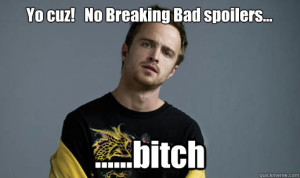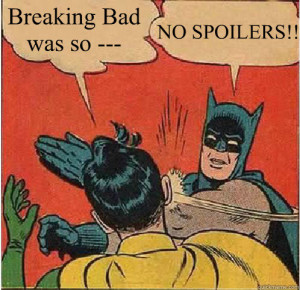Getting back to last night’s episode: in the era of the DVR, not everyone watches a show at the same time, meaning that some people were not interested in discussing “Ozymandias” at the water cooler this morning. In the era of social media, the water cooler discussion has expanded far beyond the water cooler. This raises an interesting question. In social media forums like Facebook, it is relatively easy to post spoiler warnings, but not so much on Twitter. What sort of etiquette, if any, exists to guard against accidentally revealing key plot developments to people who are not ready for them. Conversely, what is the responsibility of the spoilee to avoid discussions that might lead to spoilers? It hardly seems fair to ask people who have seen the episode, in all of its [redacted], to wait to discuss it until everyone has had a chance to see it. Continue reading
The Art of Avoiding Breaking Bad Spoilers
Reply
(Nonspecific spoilers ahead.) In an era where almost everyone has a TV show marketed directly to them, AMC’s Breaking Bad has developed a remarkably widespread—and fanatically devoted—following. The show now only has two episodes left of its five-season run, and it has been building up to what is generally predicted to be a humdinger of a finale. Last night’s episode, “Ozymandias,” certainly hit many people in the feels. That, in and of itself, should not be much of a spoiler. A spoiler, in my opinion, would have been to say that nothing of interest happened, or that the entire episode was about Data learning to be more human. Oops, wrong show, sorry.
I’ll be honest here: I think Breaking Bad is an incredible show, perhaps one of the best in television history, but I don’t love it the way some people do. I don’t feel the same emotional investment that I felt in characters from The Wire, not by a long shot.



